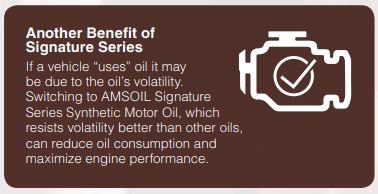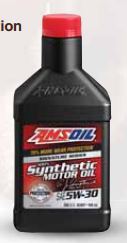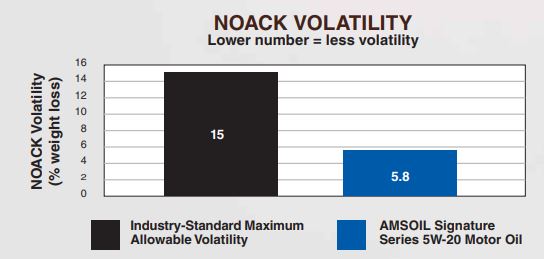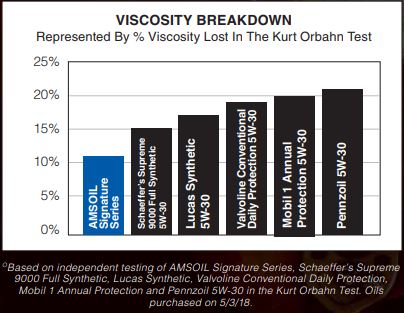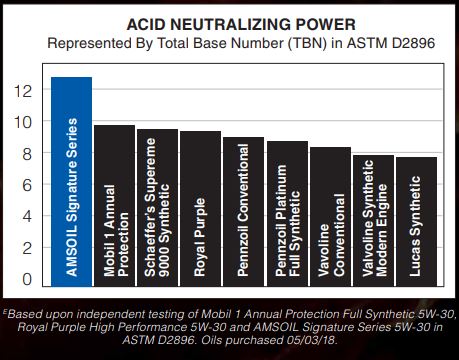SIGNATURE SERIES: THE MEASURE OF PERFORMANCE
In the NOACK Volatility Test, Signature Series scored far below the API limit for evaporation and proved it remains where it’s needed most – protecting your engine.
Nearly 35 years ago AMSOIL became the first oil manufacturer in the United States to use the NOACK Volatility Test as a measure of motor oil excellence. Today, it’s the industry standard. Originally developed and used in Europe, the NOACK test was not commonly used for lubricants until AMSOIL Founder Al Amatuzio pioneered its use for automotive motor oils in 1985. Previously, a lubricant’s flash point was the primary way to approximate its volatility.
Oil Volatility: Feeling the Burn
Modern engines generate more heat than their predecessors. At elevated temperatures, the oil’s lighter-weight molecules can volatilize, or burn-off. The more volatile a lubricant is, the lower the temperature at which the lubricant will begin to evaporate. The more it evaporates, the less oil is left to protect the engine, and frequent top-offs are required. You may have owned an automobile that mysteriously “used” motor oil.
Volatility affects more than the rate of oil consumption. When light elements in oil evaporate, the oil’s viscosity increases. This thicker oil forces the engine to work harder and can result in numerous problems:
- Reduced performance
- Reduced fuel economy
- Poor cold-temperature starting
- Increased engine deposits
- Out-of-balance oil formulation, potentially leading to reduced protection
 Signature Series Limits Oil Consumption
Signature Series Limits Oil Consumption
Signature Series has a uniform molecular structure that limits evaporation and keeps it where it’s needed most – protecting your engine. It limits the volatility (burnoff) that occurs when oil gets hot, protecting against the harmful effects of oil thickening, additive imbalance, higher emissions and oil consumption. A lower NOACK number indicates better resistance to evaporation. Signature Series falls far below the API limit for volatility, reducing the need for frequent oil top-offs and limiting vehicle emissions.
Note on these Tests and Additives
When your friend(s) tell you that they use and suggest one of these “aftermarket oil additives” to enhance the motor oil’s properties just smile knowing these totally skew and throw off the careful balance of the years of perfection of a high quality motor oil. AMSOIL is forever researching the best additives for their oils and even if it’s a great additive, the mixing process alters all of the below tests from working the way they should especially viscosity retention and anti-corrosion. Additives void all AMSOIL’s warranties and can be easily detected in the oils.
NOACK Volatility Test
In the NOACK test, an oil sample is weighed and heated to 250°C (482°F) for one hour. Dry air is passed over the sample, carrying the oil vapors that have boiled off and depositing them in a beaker. The original sample is removed and re-weighed. Any reduction in weight is reported as a percentage loss of the original weight.
Signature Series Fights Viscosity Breakdown
AMSOIL fights viscosity breakdown better than the competition, providing superior protection of pistons, cams and bearings.
Signature Series Neutralizes Acids
AMSOIL Signature Series is fortified with a heavy treatment of detergent additive and it delivers 30% more acid neutralizing power than Mobil 1, and 36% more than Royal Purple, helping engines to stay cleaner, Longer. BTW, who owns Royal Purple now?? lol
WELL-BALANCED PROTECTION
Signature Series’ well-balanced formula delivers exceptional protection in all areas of motor oil performance.
Signature Series Fights Wear
AMSOIL Signature Series Synthetic Motor Oil provides 75 percent more engine protection against horsepower loss and wear than required by a leading industry standard, extending the life of vital components like pistons and cams. Based on independent testing in the ASTM D6891 test using 0W-20 as worst-case representation.
Signature Series Guards Turbos
Signature Series protects turbochargers 72% better than required by the GM dexos1® Gen 2 specification. Based on independent testing of AMSOIL Signature Series 5W-30 in the GM turbo coking test.
Signature Series Protects Against LSPI
AMSOIL synthetic motor oils achieved 100% protection against LSPI. Based on zero LSPI events in five consecutive tests of AMSOIL Signature Series, XL and OE 5W-30 Motor Oil in the LSPI engine test required by the GM dexos1 Gen 2 specification.
Signature Series Cleans
AMSOIL Signature Series Synthetic Motor Oil has 50% more detergents to help keep oil passages clean and promote oil circulation. It provides 90% better protection against sludge vs. AMSOIL OE Motor Oil Based on independent testing of AMSOIL Signature Series 5W-30 in the ASTM D6593 engine test for oil screen plugging as required by the API SN PLUS specification.
You asked for Schaeffer’s to be included in our testing and more to come!!


